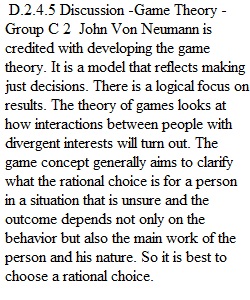


Q D.2.4.5 Discussion -Game Theory - Group C 2 From ECON-102-OMH-CRN55774 #1 Golden Balls- Split or Steal #2 Golden Balls- The Weirdest Split or Steal Ever! Need Help? • D.2.2.2 Advanced Explanations-Game Theory #1 • D.2.2.3 Advanced Explanation- Game Theory #2- Dominant Strategy- Nash Equilibrium Discussion Question: Watch both episodes of Golden Balls. Using your knowledge of of the concepts of Game Theory analyze the strategy of the two games. • Use Game Theory to analyze why the male player loses in clip #1. • Use Game Theory to explain what takes place in game #2 Need Help? • D.2.2.2 Advanced Explanations-Game Theory #1 • D.2.2.3 Advanced Explanation- Game Theory #2- Dominant Strategy- Nash Equilibrium Discussion Question Requirements: Each student is required to post a 150 word response to the question. The student then must post at least a 50 word response to at lease ONE other student post. Post-=4 points. Comment = 2 Points Submit Original Post by the Due Date. Comments are open for four (4) days after the Due Date or until the Available Until Date
View Related Questions